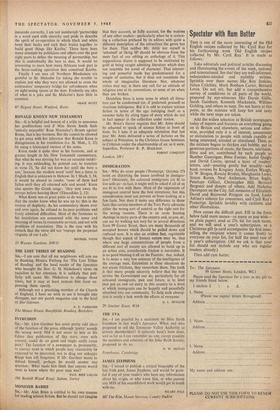SIR, — Mr. Alan Brien is entitled to his own reasons for
reading science fiction. But he should not imagine that they account, or fully account, for the motives of any other readers—particularly when he is review- ing a collection prefaced by its editors with quite a different description of the attractions the genre has for them. That neither Mr. Amis nor myself is 'ashamed' at liking SF should be obvious from the mere fact of our editing an anthology of it. This suppositious shame is supposed to be motivated by guilt at being caught admiring literature which does not resemble the novel of character. That interest- ing and powerful mode has predominated for a couple of centuries, but it does not constitute the whole of imaginative literature. Nor, whatever critics may say, is there any call for an attitude of religious awe at its conventions, or sense of sin when they are broken.
Doubtless there is some sense in which all litera- ture can be condemned (or, if preferred, praised) as vicarious indulgence. But it is odd to explain science fiction in terms of the ego indulging itself as a monster baby by citing types of story which do not in fact appear in the collection under review.
Mr. Brien's theory requires that Mr. Amis should be ashamed to speak of science fiction in front of dons. So 1 take it as adequate refutation that last year Mr. Amis delivered a series of lectures on the subject at Princeton, to the Christian Gauss Seminars in Criticism under the chairmanship of an, as it were, Superdon. Professor R. P. Blackmur.
ROBERT CONQUEST
London. SW I














































 Previous page
Previous page